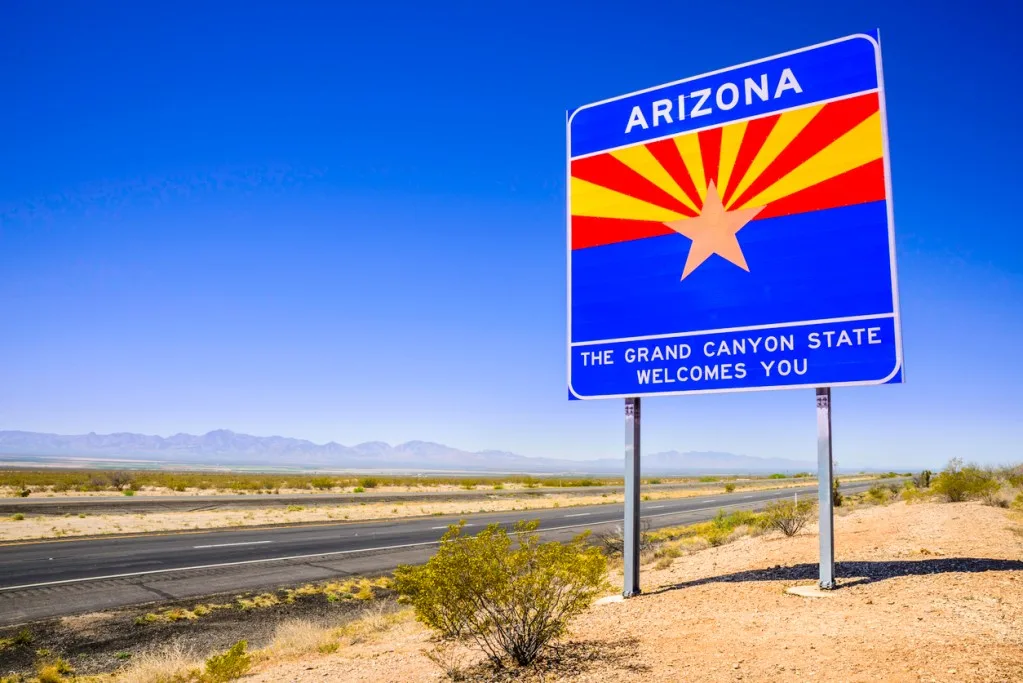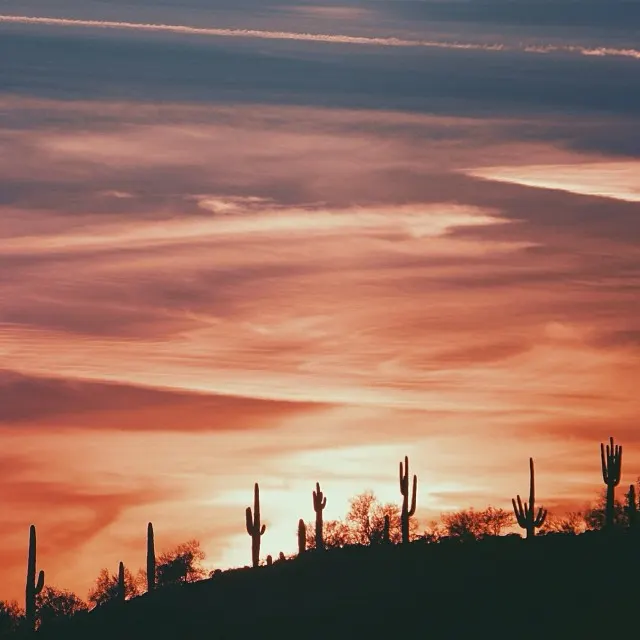When you imagine RVing in Arizona, do tumbleweeds come to mind? Or maybe you envision a lonely bull skull atop a creepy old shack in the middle of nowhere. We get it. We watch movies too.
But the reality is that Arizona is the sixth largest state in the nation with abundant protected land. Not only that, but the climate varies greatly depending on where you are and what season you visit.
Believe it or not, you might love RVing in Arizona.
Let’s check it out!
About Arizona
Arizona is a Southwestern state known for its dry climate and sprawling desert landscape. Native American civilizations like Hohokam and Anasazi thrived there for centuries until Spanish colonization in the 1500s. Although the state was briefly a part of Mexico, Americans took possession in 1853, and it became an official state of the union in 1912.
Each of Arizona’s main cities has distinct cultural vibes. Phoenix, the state capital, is by far the most populated yet least interesting. This massive city and surrounding suburbs are the perfect place for sun lovers who just want a home, job, and school for their kids.
Tuscon is only slightly less populated but exponentially more hip. It’s about two hours south of the Phoenix Metropolitan area. The art scene is poppin’, and housing isn’t out of control yet. And for those looking for quieter surroundings and cooler weather, you have Flagstaff and Sedona in the northern part of the state.
Highlights for nature lovers in Arizona include Grand Canyon National Park and The Arizona Trail. Additionally, the state’s Sonoran Desert region in the south is the only place on Earth where the saguaro cactus grows. It’s a protected plant in Arizona.

5 Reasons Not to RV in Arizona
Don’t plan to RV in Arizona if you hate the sun and wide open spaces or if privacy isn’t really your thing. However, if any of these aspects appeal to you, you’ll probably love Arizona. But just in case, we made a list of five reasons you may want to avoid RVing in The Grand Canyon State.
You Enjoy Shoveling Snow
Believe it or not, it snows in some parts of Arizona. For those who just can’t get enough of shoveling your RV out of a snowstorm or dealing with frozen pipes, there’s Flagstaff. But for the rest of us, winter weather in Arizona is a dream come true.
During the winter, average daytime temperatures in Phoenix and Tuscon range from the 50s to the mid-70s. It’s a snowbird’s paradise. In contrast, an average day in July can reach 120 degrees Fahrenheit or hotter. So if mild climates are your thing, make a move outta dodge around April.
Remember that evening temperature can drop about 20 degrees due to the dry air. So if it’s warm enough for winter shorts during the day, be sure to have extra layers around for nightfall.
Crowded Campgrounds Are Your Favorite
For those of you who like some personal space when RVing, you may really appreciate the open land available in Arizona. Public lands make up about 40% of Arizona’s acreage. This means boondocking and dispersed camping opportunities are plentiful.
Northern sites by the Grand Canyon include Coconino Rim Road and Forest Road 171. But if southern Arizona is more your style, try the Coronado National Forest or camping near Organ Pipe National Monument.
You can visit the website of the Bureau of Land Management (BLM) or your favorite boondocking app to scope out some sweet camping spots.
Beautiful Sunsets Get on Your Nerves
Believe it or not, some people find sunsets incredibly relaxing, if not awe-inspiring. If you don’t care for watching the sun go down and creating gorgeous colorful sky art, then don’t go to Arizona. Amazing sunsets are unavoidable!
The combination of open sky, dry air, and high clouds make Arizona one of the best places to see a beautiful sunset. The views are spectacular, especially with so many canyons and mountains around.

You’re Scared of Spikey Plants
It’s true. Dancing with cacti is painful and not recommended. But gosh, they are neat to look at.
Arizona is home to over 80 different species of cactus. You have the beloved saguaro, which can live over 100 years. And then there’s the shorter, plump barrel cactus with its delicate flowering blooms. And if you’re too afraid to go near a prickly pear cactus, try the delicious jam locals make from it.
Head to the Desert Botanical Garden or Boyce Thompon Arboretum to learn about Arizona’s native plants. You might be surprised to find out that more than just cacti thrive in the Southwestern desert climate.
Taco Tuesday Is Your Least Favorite Day
Who doesn’t love a taco? If you don’t, it may be because you haven’t had a good one. Since Arizona is the Mexican food mecca of the United States, we recommend trying one while you’re there.
Tucson’s Mexican restaurants might be some of the best in the world. El Charro, the city’s oldest restaurant, founded in 1922, is said to be the birthplace of the chimichanga. Lineages of family chefs know how sophisticated Mexican cuisine can be. The result is a booming metropolis of delicious food.

How Much Does RVing Cost in Arizona?
Overnight RVing in Arizona State Parks cost approximately $15 to $50 per night. Additional vehicles towed in for daily transportation are free. But other cars in your party will cost an extra fee.
Private RV parks are a little more expensive. For example, the price to camp in Deer Valley Park in Phoenix ranges from about $56 to $74, depending on the season. However, if you’re planning to stay a month, you can knock your fees down to around $20 per night before taxes.
Can You Park an RV Anywhere in Arizona?
As with any state, certain rules determine where RVing is allowed in Arizona. Instead of reading every chapter and bylaw, we recommend using boondocking apps and websites. You’ll save a lot of time by reading reviews, rules, and comments from like-minded campers.
Freecampsites.net is great for scouting public land options. Plus, it’s free to use. iOverlander is another excellent search tool, especially if you’re traveling abroad. Take the time to read reviews to make sure your RV will fit in your desired location and what the road conditions are.
And, of course, our list wouldn’t be complete without Campedium. You can search by city and choose free when filtering price options. And if you want more details, check out the US Public Lands phone app. It’ll help you find public land borders so you don’t inadvertently end up on private land.
Is Boondocking Legal in Arizona?
It depends. Arizona offers three types of land where you can park an RV. First, we have State Parks, where parking is restricted to developed campgrounds with fees. Second, are the Arizona State Trust Lands. A recreational permit for the allotted 14 days per year costs about $15. Not bad for access to nine million acres of boondocking options.
The third kind of land in Arizona that’s excellent for RVing are areas supervised by the Bureau of Land Management. This includes public lands and national forests. Although you don’t need a permit, you must follow BLM rules and stay no longer than 14 days. Special long-term passes are available if you want to camp for more than two weeks in the fall and winter.
Is RVing in Arizona Worth It?
We think RVing in Arizona is so fantastic that we had to have some fun with this one. You can park your RV for free and enjoy the sunset with just your family by your side. Or you can camp in designated campgrounds right next to the Grand Canyon. Moreover, we think Southern Arizona has some overlooked RVing spots close to cool cities like Tuscon.
Just remember, the summer sun in Arizona is intense. This may be the only season to avoid RVing in Arizona!
Discover the Best Free Camping Across the USA
To be honest with you, we hate paying for camping. There are so many free campsites in America (with complete privacy).
You should give it a try!
As a matter of fact, these free campsites are yours. Every time you pay federal taxes, you’re contributing to these lands.
Become a FREE CAMPING INSIDER and join the 100,000 campers who love to score the best site!
We’ll send you the 50 Best Free Campsites in the USA (one per state). Access the list by submitting your email below: